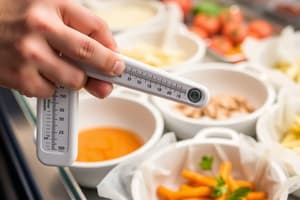Podcast
Questions and Answers
After using a meat slicer, you should:
After using a meat slicer, you should:
Wash it with soapy water, rinse, and sanitize
Before touching prepared food with your hands, you must:
Before touching prepared food with your hands, you must:
Put on latex-free disposable gloves
Complete this statement: Food service gloves should be put on after washing hands with _____
Complete this statement: Food service gloves should be put on after washing hands with _____
soap and water
Equipment such as chafing dishes, steam tables and heated cabinets should keep food temperatures at _____ or hotter:
Equipment such as chafing dishes, steam tables and heated cabinets should keep food temperatures at _____ or hotter:
Food that makes people sick will often:
Food that makes people sick will often:
Ground turkey must be cooked to an internal temperature of 165°F (74°C). Why must turkey be cooked to this minimum temperature?
Ground turkey must be cooked to an internal temperature of 165°F (74°C). Why must turkey be cooked to this minimum temperature?
If there are any doubts about the safety of a food product, you should:
If there are any doubts about the safety of a food product, you should:
It is okay to use the same gloves to chop raw onion, then raw meat, and put both into a skillet.
It is okay to use the same gloves to chop raw onion, then raw meat, and put both into a skillet.
It is safe to eat baked goods that have been handled using:
It is safe to eat baked goods that have been handled using:
It is safe to handle food that requires no additional preparation before service with:
It is safe to handle food that requires no additional preparation before service with:
The best way to keep the hands free from contamination is to?
The best way to keep the hands free from contamination is to?
The chef touches raw sausage and then touches toasted bread.
The chef touches raw sausage and then touches toasted bread.
The food sanitation rules require someone at your restaurant to:
The food sanitation rules require someone at your restaurant to:
The manager is responsible for knowing the food sanitation rules. This includes supervision of food handlers in recognizing problems with:
The manager is responsible for knowing the food sanitation rules. This includes supervision of food handlers in recognizing problems with:
The manager is responsible for training you about food safety in your job duties, which includes:
The manager is responsible for training you about food safety in your job duties, which includes:
The manager is responsible for training you about food safety in your job duties. These duties include preventing foodborne illness by:
The manager is responsible for training you about food safety in your job duties. These duties include preventing foodborne illness by:
The manager's most important food safety responsibility is training you to:
The manager's most important food safety responsibility is training you to:
The most important reason to properly clean a cutting board is to:
The most important reason to properly clean a cutting board is to:
The required minimum cooking temperature for ground beef is 155°F (68°C). Why must ground beef be cooked to this temperature?
The required minimum cooking temperature for ground beef is 155°F (68°C). Why must ground beef be cooked to this temperature?
Unpackaged prepared food that requires no additional preparation before service may be:
Unpackaged prepared food that requires no additional preparation before service may be:
Wearing gloves can keep food safe by:
Wearing gloves can keep food safe by:
What precaution must you take with the beverage container, so you can drink from it while working in the kitchen? Of the descriptions below which one would be allowed?
What precaution must you take with the beverage container, so you can drink from it while working in the kitchen? Of the descriptions below which one would be allowed?
When must a food handler wash their hands?
When must a food handler wash their hands?
When storing raw meat in a refrigerator, it is most important to store it:
When storing raw meat in a refrigerator, it is most important to store it:
When you display food in ice, the food must be:
When you display food in ice, the food must be:
Where should you store raw fish in a refrigerator?
Where should you store raw fish in a refrigerator?
Which of the following foods does not support bacteria growth?
Which of the following foods does not support bacteria growth?
Working on the cook line can be busy. It is best to:
Working on the cook line can be busy. It is best to:
You are making omelets. How should you handle the eggs to keep omelets safe?
You are making omelets. How should you handle the eggs to keep omelets safe?
You can best prevent foodborne illness by:
You can best prevent foodborne illness by:
You have an infected cut on your hand that is swollen and red. You:
You have an infected cut on your hand that is swollen and red. You:
You have been sick with diarrhea. What answer would be accepted by the health department?
You have been sick with diarrhea. What answer would be accepted by the health department?
You wake up not feeling well, but you are scheduled to work. What symptom would require you to stay home from work?
You wake up not feeling well, but you are scheduled to work. What symptom would require you to stay home from work?
Flashcards are hidden until you start studying
Study Notes
Food Safety Practices
- After using a meat slicer, wash with soapy water, rinse, and sanitize to prevent cross-contamination.
- Always wear latex-free disposable gloves when handling prepared food with hands.
- Food service gloves should only be put on after hands have been washed with soap and water for effective hygiene.
Food Temperature Guidelines
- Equipment like chafing dishes and steam tables must maintain food at a minimum temperature of 135°F (57°C) to ensure safety.
- Ground turkey must reach an internal temperature of 165°F (74°C) to kill harmful germs, as they can survive at lower temperatures.
- The required minimum cooking temperature for ground beef is 155°F (68°C) to eliminate potential pathogens.
Food Contamination Risks
- Contaminated food may taste normal, underscoring the importance of prevention measures.
- Discard any food product if there are doubts about its safety.
- Using the same gloves to handle raw onion and raw meat may lead to contamination.
Safe Food Handling Techniques
- Safe handling of baked goods can be done using deli paper.
- Clean utensils, tongs, or disposable gloves should be used for food that requires no further preparation.
- Always use tongs for raw meat to minimize hand contamination during food preparation.
Employee Health and Supervision
- A designated person in the restaurant must understand food sanitation rules to ensure compliance and safety.
- Managers are responsible for supervising food handlers and demonstrating proper cooking temperatures.
- Training employees about food safety and proper handwashing techniques is a critical manager responsibility.
Prevention of Foodborne Illness
- Food contamination can be prevented by proper food storage and knowing when to report illness.
- The most effective way to prevent foodborne illness is through diligent hand washing, especially after handling raw meat.
- It is best to manage kitchen tasks efficiently by washing hands and using utensils to avoid direct contact with raw foods.
Food Storage Guidelines
- Store raw meat in a refrigerator below ready-to-eat food to prevent cross-contamination.
- When displaying food in ice, ensure it stays at 41°F (5°C) or colder.
- Raw fish should also be stored in the refrigerator below ready-to-eat foods.
Hygiene and Illness Reporting
- Always wash hands after using the restroom or toilet room to maintain cleanliness.
- If you have an infected cut on your hand, ensure it's covered properly before handling food.
- Symptoms such as vomiting require staying home from work, and diarrhea must be resolved for at least two days before returning to food handling duties.
Handling Specific Foods
- During omelet preparation, only crack the number of eggs needed at that moment to ensure safety and freshness.
- Raw carrots do not support bacterial growth, making them a safer food choice in terms of spoilage.
- For beverages in the kitchen, use a cup with a tight lid and straw to prevent contamination while working.
Studying That Suits You
Use AI to generate personalized quizzes and flashcards to suit your learning preferences.




